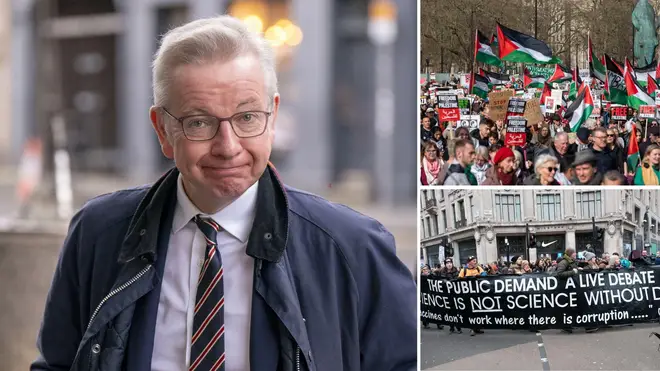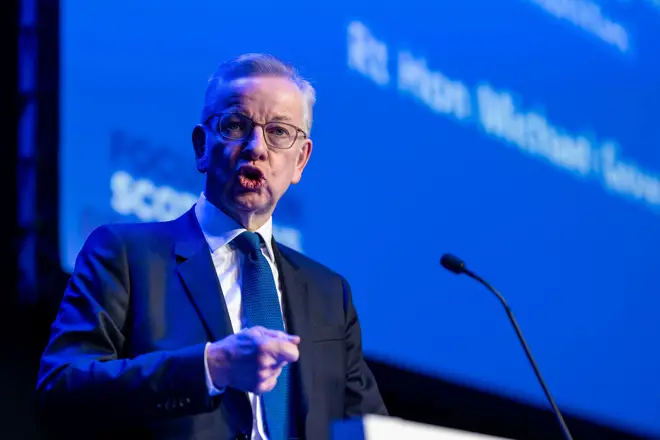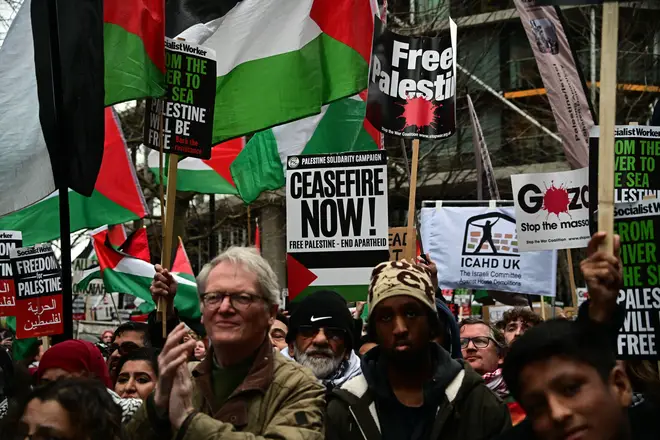
Richard Spurr 1am - 4am
9 March 2024, 23:55 | Updated: 10 March 2024, 07:02

Pro-Palestinian marchers should question whether extremist groups are behind some of the protests, Michael Gove said.
He said "good-hearted people" who have taken part in marches should be aware they could be "lending credence" to extremists.
The Communities Secretary, who is set to produce a new official definition of extremism within days, also warned that chanting "from the river to the sea" meant calling for the "erasure" of Israel and risked fuelling hate and intimidation.
In the most recent march, thousands of people took to the streets of London to demand a ceasefire in Gaza.
Mr Gove told the Sunday Telegraph the new definition of extremist groups would help protesters decide whether to attend pro-Palestinian events.
"If we're clear about the nature of extremist organisations, then I think that means that some of the people - and there are good-hearted people who go on these marches, I don't agree with them, but they're moved by suffering and they want peace - but it may help some of them to question who are organising some of these events. I won't go into details now, but we will later," he said.
"Some of the events that have been organised, have been organised by extremist organisations.

"That doesn't mean that people who have gone on them are extremist, quite the opposite. But it means that you can begin to question: do you really want to be lending credence to this organisation? If you do, fair enough. But now there is no excuse for ignorance."
Focusing on the chant of "from the river to the sea" - a reference to a Palestinian state stretching from the River Jordan to the Mediterranean - Mr Gove said: "We can also have a broader conversation about the way in which some of what's said on these marches springs from an extremist ideology, rather than simply being an expression of passionate opposition to conflict.
"'From the river to the sea' is not a call for peace... when you're saying 'from the river to the sea', you're explicitly saying: 'I want to see the end of Israel as a Jewish state, the Jewish homeland erased.'
"Now, be clear about that and be clear about what that means.
"Be clear about the fact that you know a key Islamist demand is the erasure of what they see as the 'Zionist entity' or the 'crusader Zionist state'.
"And therefore, let's be clear that there is a difference between a cry for peace and the legitimisation of an extremist position which intimidates and leads to hate."
The Government's new definition will replace one in the existing Prevent counter-radicalisation programme, giving "more specificity", and will enable the Government and other public bodies to ban funding and engagement with Islamist and far-right groups.

Mr Gove sought to address fears from some Tories that the new definition could encompass gender-critical feminists or devout religious groups.
"It's only extremism if you translate that into a political ideology that is anti-democratic," he said.
"Private belief should be cherished. Free speech has to be protected."
Mr Gove hinted that foreign governments such as Iran could be behind some of the extremist groups operating in the UK.
"One of the things that we're explicitly looking at is the way in which foreign state and non-state actors seek to encourage extremism here," he said.
"And again, this is inevitably sensitive work about which I can say only a very limited amount because it's not only Iran that attempts to use some of these forces to destabilise British democracy."
Meanwhile, the Observer reported that Mr Gove's officials fear the new definition could face a legal challenge.
"The Government wants to launch this without a public consultation on the definition, or proper engagement with faith leaders," said one official who has seen the proposals.
"It's never going to work."